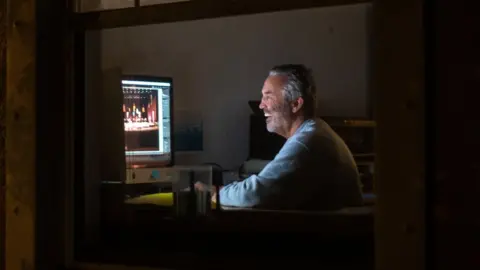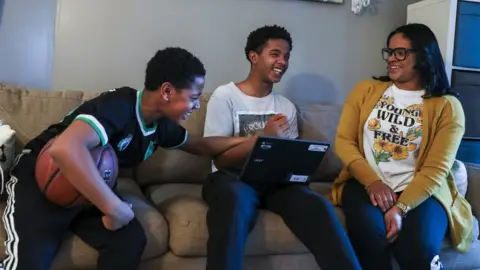Coronavirus: A college course world wants to study right now
 Getty Images
Getty ImagesWith a third of the global population living under lockdown, many are turning to science for the answers on how to be happy in these difficult times.
By the evening of 26 March, 1.3 million people were enrolled in a Yale University online course entitled: The Science of Well Being.
Studying happiness may not be the first field that pops into your head when you think of science, but there's undeniable public interest - especially since Covid-19 began.
From the start of December until 26 March, the number of learners enrolled from the US has shot up 295%, according to Yale. While the US accounts for most of the students, Canada, the UK and India also make the top five. Dozens of the countries and regions where learners come from have more than doubled their enrolment in the same time frame. The enrolment page has over 13m recent views.
Professor Laurie Santos, who teaches the course online and on campus, says it was immensely popular when she first offered it to university students too - becoming the largest class ever in Yale's 300-year history. Nearly one quarter of the entire student body was taking it, she told the BBC.
"That made me realise there was really a market for this beyond my campus," Prof Santos says. When the online education platform Coursera published a digital version in 2018, it became one of the largest classes there too.
"What's particularly crazy is the last three weeks - from March 2018 to the end of February 2020 we had around 500,000 learners, but just in the last three weeks we've more than doubled that."
"We had 300,000 [enrol] over the weekend," she adds, with students coming from all walks of life, from healthcare providers to prison workers.
The surge of new students may be due to our instinct to look for solutions and ways to take control in times of crisis - as well as thanks to the extra time those stuck indoors now have.
"[It's] an act of taking agency over your mental health, and doing so in an evidence-based way," Prof Santos says.
 Getty Images
Getty Images
Tips for being happier now
Neuroscientist Emiliana Simon-Thomas co-teaches an edX course on the science of happiness which has been taken by over half a million students globally - here are her top three tips:
1. Mindfulness
"Just taking five minutes to notice the sensation in your body, the sensations around you...really grounding in the moment you're in, trying not to surrender to the constant looking forward and backward."
2. Connect with others
"Spending time deliberately talking with others about your experience, their experience, and if you can, what's going well. It's impossible not to feel worried, but can you ask someone - what did you enjoy today? Was it the hot water in your shower? A particularly interesting conversation or some video you watched that was really moving or inspiring?"
3. Practise gratitude
"Deliberately writing down on a given day what has gone well and who played a hand in that. Sometimes it's not your spouse or your neighbor but someone you don't know, who might have harvested the fruit that you eat. Really delving into our sense of common humanity in this time is important and a way to recognise [our] potential to overcome this challenge as a community."

So how does it work?
While it can seem odd to take a scientific approach to happiness, the general study process is straightforward: researchers survey happy people, study their behaviours and test whether unhappy people can improve their wellbeing by doing the same.
Essentially, many of our base conceptions of what makes us happy are incorrect, Prof Santos explains.
"We think it comes from our circumstances, the amount of money we get, our material possessions. My college students think perfect grades equals happiness. But what the research shows is that's simply not the case."
Teaching happiness then means teaching people to not "double down on bad theories".
In this pandemic, she says, that could be thinking you need to buy, say, new furniture to feel happy - and when that doesn't work, deciding you just need to buy a better item.
"We're in some sense correcting people's intuitions about the kinds of things that really make for a good life."
Then, it's up to the learners to put those things into practice. "We try to help a bit about that - all the homework in the class is doing these interventions we know improve wellbeing."

- A SIMPLE GUIDE: What are the symptoms?
- AVOIDING CONTACT: Should I self-isolate?
- STRESS: How to protect your mental health
- VIDEO: The 20-second hand wash

Neuroscientist Emiliana Simon-Thomas, the Science Director of the Greater Good Science Center at the University of California, Berkeley, says: "The biggest problem with this crisis is that it's so uncertain."
Our nervous systems are evolutionarily designed to find patterns in our environments and create associations, she explains, but with a rapidly evolving situation like Covid-19, it's impossible to satisfy that urge.
People in these situations tend to either look backwards for solutions or ruminate about possible futures: Will I go back to work? Will I be able to afford getting sick? Can I support my family if they get sick?
"While both those abilities are very adaptive in solving immediate problems or challenges or an immediate threat, they're very harmful in situations like the one we're in the middle of where the threat is ambiguous, the duration is unknown."
This pandemic is particularly challenging as many of the ways people might normally cope with uncertainty and anxiety - like visiting a parent or going to the pub with friends - are off the table over physical health concerns.
So what does improved well-being look like in this new locked down landscape?
"The good news is this is not the flu of 1918," Prof Santos says. "We have technology that can allow us to connect with people - maybe not in real life but in real time. We can see expressions, hear them laugh, be present in people's lives."
She suggests finding ways to do so in informal ways, like video-calling a loved one while making dinner, since those quotidian interactions are often what we miss in isolation.
Throughout this global crisis, people have come together, finding ways to connect despite the barriers of quarantines and distancing. Videos of Italians singing together on their balconies went viral in recent weeks. Stories of socially-distanced family celebrations are also making headlines.
"Different ways of framing things can be really powerful in terms of affecting our emotions as we plan for and deal with this crisis," Prof Santos adds.
"Despite how anxious all this feels, we get to control our narrative and framing of this crisis - we can think of it as an awful situation or we can think of it as a challenge that our families are facing together."
